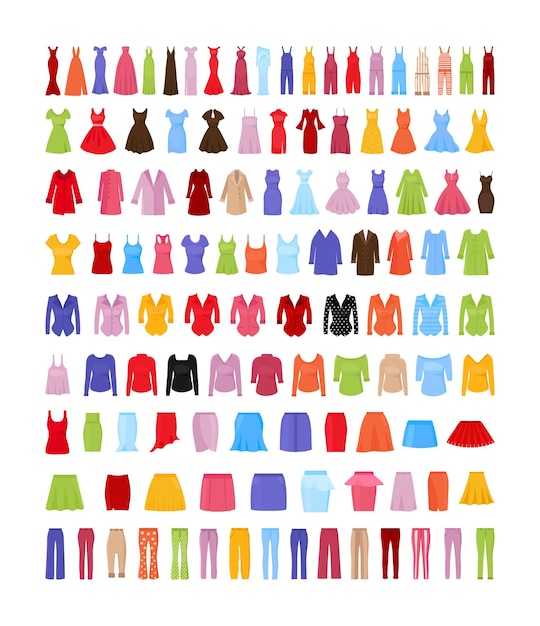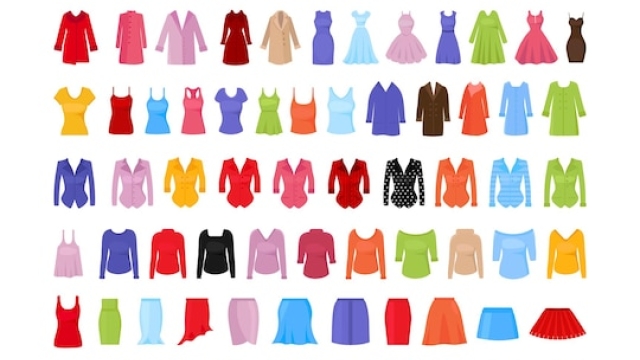In the fast-paced world of fashion, women have always been at the forefront, effortlessly embracing new trends and showcasing their unique sense of style. With each passing season, the world of women’s fashion and apparel continues to evolve, inspiring confidence and empowering women to express themselves through the art of dressing. From chic runway designs to timeless classics, fashion has the remarkable ability to not only enhance outer beauty but also reflect inner strength and individuality. This article unveils the latest trends and must-have apparel that are empowering women to make a statement and redefine fashion on their own terms. So, let’s take a dive into this exciting world of empowerment and self-expression through fashion.
Celebrating Individuality: The Rise of Inclusive Fashion
The fashion industry has undergone a significant transformation in recent years, embracing the concept of inclusivity and celebrating individuality. Women’s fashion and apparel have become an empowering platform for self-expression and breaking traditional norms.
One of the key drivers behind this revolution is the increasing demand for diverse and inclusive representation. Women of all shapes, sizes, ages, and backgrounds are now being catered to by fashion brands. This shift has resulted in a broader range of sizes, more varied models, and a wider selection of styles to choose from.
Moreover, the rise of social media has played a crucial role in empowering women to embrace their unique sense of style. Fashion influencers and bloggers have emerged as powerful voices, showcasing their individuality and influencing trends. This newfound representation has allowed women to explore their personal style preferences without feeling limited or judged.
Inclusive fashion is also being championed by brands that prioritize sustainability and ethical production. Consumers are now becoming more conscious of the impact their fashion choices have on the environment and society. As a result, brands are offering eco-friendly and socially responsible options, enabling women to express their style while supporting a greater cause.
In summary, the rise of inclusive fashion has opened up new avenues for women to embrace their individuality and express themselves through clothing. This shift has been fueled by the demand for diverse representation and the increasing power of social media influencers. As the industry continues to evolve, we can look forward to an even more inclusive and empowering future for women’s fashion and apparel.
Breaking Stereotypes: Redefining Women’s Clothing
In today’s ever-evolving fashion industry, women’s clothing has undergone a remarkable transformation, striding towards breaking down stereotypes and embracing individuality. With a focus on inclusivity and self-expression, designers and brands are challenging conventional norms, offering a diverse range of styles that empower women to redefine their personal style.
Expanding beyond traditional gender norms, women now have the freedom to experiment with a wide array of clothing choices. The rigid boundaries that once confined women to predictable outfits are no longer the norm. Instead, we see bold combinations of materials, colors, and silhouettes that celebrate uniqueness and cater to individual preferences.
Rivet Bag

Moreover, the rise of gender-neutral clothing has played a significant role in breaking stereotypes associated with women’s fashion. By embracing androgynous styles, women are challenging societal expectations and expressing their individuality. This inclusivity allows fashion to transcend any binary limitations and emphasizes that clothing is a form of self-expression, irrespective of gender.
Fashion brands are also redefining women’s clothing by addressing the diverse needs and perspectives of modern women. Recognizing the importance of comfortable yet stylish apparel, designers are creating versatile pieces that cater to a wide range of body types and lifestyles. Whether it’s inclusive sizing, adaptive clothing, or sustainable materials, the focus is shifting towards empowering women to feel confident and comfortable in their own skin.
In essence, the evolution of women’s clothing is a powerful testament to the progress we have made in breaking stereotypes and embracing individuality. By challenging societal norms and prioritizing inclusivity and self-expression, women now have the opportunity to redefine their personal style, shatter expectations, and embrace fashion as a means of empowerment.
Sustainable Fashion: Making Responsible Choices
Fashion plays a significant role in our lives, allowing us to express ourselves and reflect our individuality. However, it is essential to consider the environmental and social impact of the choices we make when it comes to women’s fashion and apparel. Embracing sustainable fashion practices enables us to make responsible choices that contribute to a better future.
One way to promote sustainability in the fashion industry is by opting for eco-friendly fabrics and materials. Natural fibers such as organic cotton, hemp, or bamboo are renewable resources that have a lower environmental footprint compared to synthetic materials like polyester. By choosing garments made from these materials, we support brands that prioritize sustainability and reduce the overall demand for less eco-friendly alternatives.
Additionally, supporting ethical fashion brands that prioritize fair labor practices is crucial in empowering women through fashion. Women make up a significant part of the global fashion industry workforce, and ensuring their rights are respected is essential for creating a more inclusive and equitable industry. By choosing brands that prioritize fair wages, safe working conditions, and transparency, we contribute to empowering women throughout the supply chain.
Furthermore, promoting the concept of circular fashion can greatly contribute to sustainability. Instead of disposing of clothing after limited use, we should prioritize clothing rental and second-hand shopping. Renting clothing for special occasions or purchasing pre-loved garments reduces waste and extends the lifecycle of clothing items. Moreover, donating or recycling old clothing prevents them from ending up in landfill sites and reduces the environmental burden of the fashion industry.
By making responsible choices and embracing sustainable fashion practices, we can empower women through fashion while simultaneously working towards a more environmentally conscious and socially responsible future. Taking steps to support sustainable brands, opt for eco-friendly materials, and promote circular fashion will undoubtedly make a positive impact both for women and the planet.



